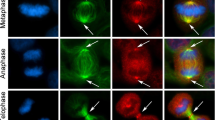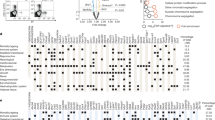Abstract
An RNAi-based functional screening of mitotic kinases in Drosophila recently identified a number of members of the kinome that are required for normal cell division. Depletion of these kinases resulted in a number of different mitotic abnormalities including spindle malformation, chromosome mis-segregation, centrosome amplification and failure of cytokinesis (Bettencourt-Dias et al. in Nature 432:980–987, 2004). Since mitotic defects are commonly observed in cancer cells, these kinases may contribute to tumor development and/or progression. To investigate whether common genetic variation in the mitotic kinases are associated with breast cancer risk, we genotyped 386 single nucleotide polymorphisms (SNPs) from 44 mitotic kinase genes, in 798 breast cancer cases and 843 unaffected controls from a clinic-based study. A total of 22 SNPs from 13 kinase genes displayed significant associations with breast cancer risk (P trend ≤ 0.05), including two SNPs from FYN (rs6914091 and rs1465061) that remained of interest after accounting for multiple testing (q = 0.06). These associations were stronger when evaluating cases with estrogen and progesterone receptor positive tumors. In addition, haplotype-based tests identified significant associations with risk for common haplotypes of the MAST2 (P = 0.04) and MAP2K4 (P = 0.006) genes. Although requiring replication, these findings suggest that genetic polymorphisms in mitotic kinases that have been implicated in chromosome instability and aneuploidy may contribute to the development of breast cancer.

Similar content being viewed by others
References
Zhou H, Kuang J, Zhong L, Kuo WL, Gray JW, Sahin A, Brinkley BR, Sen S (1998) Tumour amplified kinase STK15/BTAK induces centrosome amplification, aneuploidy and transformation. Nat Genet 20:189–193. doi:10.1038/2496
Mundt KE, Golsteyn RM, Lane HA, Nigg EA (1997) On the regulation and function of human polo-like kinase 1 (PLK1): effects of overexpression on cell cycle progression. Biochem Biophys Res Commun 239:377–385. doi:10.1006/bbrc.1997.7378
Lingle WL, Barrett SL, Negron VC, D’Assoro AB, Boeneman K, Liu W, Whitehead CM, Reynolds C, Salisbury JL (2002) Centrosome amplification drives chromosomal instability in breast tumor development. Proc Natl Acad Sci USA 99:1978–1983. doi:10.1073/pnas.032479999
Li JJ, Li SA (2006) Mitotic kinases: the key to duplication, segregation, and cytokinesis errors, chromosomal instability, and oncogenesis. Pharmacol Ther 111:974–984. doi:10.1016/j.pharmthera.2006.02.006
Tanaka T, Kimura M, Matsunaga K, Fukada D, Mori H, Okano Y (1999) Centrosomal kinase AIK1 is overexpressed in invasive ductal carcinoma of the breast. Cancer Res 59:2041–2044
Yuan J, Horlin A, Hock B, Stutte HJ, Rubsamen-Waigmann H, Strebhardt K (1997) Polo-like kinase, a novel marker for cellular proliferation. Am J Pathol 150:1165–1172
Hayward DG, Clarke RB, Faragher AJ, Pillai MR, Hagan IM, Fry AM (2004) The centrosomal kinase Nek2 displays elevated levels of protein expression in human breast cancer. Cancer Res 64:7370–7376. doi:10.1158/0008-5472.CAN-04-0960
Harrington EA, Bebbington D, Moore J, Rasmussen RK, Ajose-Adeogun AO, Nakayama T, Graham JA, Demur C, Hercend T, Diu-Hercend A et al (2004) VX-680, a potent and selective small-molecule inhibitor of the Aurora kinases, suppresses tumor growth in vivo. Nat Med 10:262–267. doi:10.1038/nm1003
Spankuch B, Heim S, Kurunci-Csacsko E, Lindenau C, Yuan J, Kaufmann M, Strebhardt K (2006) Down-regulation of Polo-like kinase 1 elevates drug sensitivity of breast cancer cells in vitro and in vivo. Cancer Res 66:5836–5846. doi:10.1158/0008-5472.CAN-06-0343
Finetti P, Cervera N, Charafe-Jauffret E, Chabannon C, Charpin C, Chaffanet M, Jacquemier J, Viens P, Birnbaum D, Bertucci F (2008) Sixteen-kinase gene expression identifies luminal breast cancers with poor prognosis. Cancer Res 68:767–776. doi:10.1158/0008-5472.CAN-07-5516
Ewart-Toland A, Dai Q, Gao YT, Nagase H, Dunlop MG, Farrington SM, Barnetson RA, Anton-Culver H, Peel D, Ziogas A et al (2005) Aurora-A/STK15 T + 91A is a general low penetrance cancer susceptibility gene: a meta-analysis of multiple cancer types. Carcinogenesis 26:1368–1373. doi:10.1093/carcin/bgi085
Lo YL, Yu JC, Chen ST, Hsu GC, Mau YC, Yang SL, Wu PE, Shen CY (2007) Breast cancer risk associated with genotypic polymorphism of the mitotic checkpoint genes: a multigenic study on cancer susceptibility. Carcinogenesis 28:1079–1086. doi:10.1093/carcin/bgl256
Easton DF, Pooley KA, Dunning AM, Pharoah PD, Thompson D, Ballinger DG, Struewing JP, Morrison J, Field H, Luben R et al (2007) Genome-wide association study identifies novel breast cancer susceptibility loci. Nature 447:1087–1093. doi:10.1038/nature05887
Bettencourt-Dias M, Giet R, Sinka R, Mazumdar A, Lock WG, Balloux F, Zafiropoulos PJ, Yamaguchi S, Winter S, Carthew RW et al (2004) Genome-wide survey of protein kinases required for cell cycle progression. Nature 432:980–987. doi:10.1038/nature03160
Wang X, Goode EL, Fredericksen ZS, Vierkant RA, Pankratz VS, Liu-Mares W, Rider DN, Vachon CM, Cerhan JR, Olson JE, Couch FJ (2008) Association of genetic variation in genes implicated in the beta-catenin destruction complex with risk of breast cancer. Cancer Epidemiol Biomarkers Prev 17:2101–2108. doi:10.1158/1055-9965.EPI-08-0134
Kelemen LE, Couch FJ, Ahmed S, Dunning AM, Pharoah PD, Easton DF, Fredericksen ZS, Vierkant RA, Pankratz VS, Goode EL, Scott CG, Rider DN, Wang X, Cerhan JR, Vachon CM (2008) Genetic variation in stromal proteins decorin and lumican with breast cancer: investigations in two case–control studies. Breast Cancer Res 10:R98. doi:10.1186/bcr2201
Pesch B, Ko Y, Brauch H, Hamann U, Harth V, Rabstein S, Pierl C, Fischer HP, Baisch C, Justenhoven C et al (2005) Factors modifying the association between hormone-replacement therapy and breast cancer risk. Eur J Epidemiol 20:699–711. doi:10.1007/s10654-005-0032-0
Justenhoven C, Pierl CB, Haas S, Fischer HP, Baisch C, Hamann U, Harth V, Pesch B, Bruning T, Vollmert C et al (2008) The CYP1B1_1358_GG genotype is associated with estrogen receptor-negative breast cancer. Breast Cancer Res Treat 111:171–177. doi:10.1007/s10549-007-9762-x
Consortium International HapMap et al (2005) A haplotype map of the human genome. Nature 437:1299–1320. doi:10.1038/nature04226
Meng Z, Zaykin DV, Xu CF, Wagner M, Ehm MG (2003) Selection of genetic markers for association analyses, using linkage disequilibrium and haplotypes. Am J Hum Genet 73:115–130. doi:10.1086/376561
Breslow NE, Day NE (1987) Statistical methods in cancer research. IARC Workshop IARC Sci Publ 1987:1–406
Storey JD, Tibshirani R (2003) Statistical significance for genomewide studies. Proc Natl Acad Sci USA 100:9440–9445. doi:10.1073/pnas.1530509100
Gabriel SB, Schaffner SF, Nguyen H, Moore JM, Roy J, Blumenstiel B, Higgins J, DeFelice M, Lochner A, Faggart M et al (2002) The structure of haplotype blocks in the human genome. Science 296:2225–2229. doi:10.1126/science.1069424
Lake SL, Lyon H, Tantisira K, Silverman EK, Weiss ST, Laird NM, Schaid DJ (2003) Estimation and tests of haplotype-environment interaction when linkage phase is ambiguous. Hum Hered 55:56–65. doi:10.1159/000071811
Marchini J, Donnelly P, Cardon LR (2005) Genome-wide strategies for detecting multiple loci that influence complex diseases. Nat Genet 37:413–417. doi:10.1038/ng1537
Cooke MP, Abraham KM, Forbush KA, Perlmutter RM (1991) Regulation of T cell receptor signaling by a src family protein-tyrosine kinase (p59fyn). Cell 65:281–291. doi:10.1016/0092-8674(91)90162-R
Calautti E, Grossi M, Mammucari C, Aoyama Y, Pirro M, Ono Y, Li J, Dotto GP (2002) Fyn tyrosine kinase is a downstream mediator of Rho/PRK2 function in keratinocyte cell-cell adhesion. J Cell Biol 156:137–148. doi:10.1083/jcb.200105140
Sorensen KD, Borre M, Orntoft TF, Dyrskjot L, Torring N (2008) Chromosomal deletion, promoter hypermethylation and downregulation of FYN in prostate cancer. Int J Cancer 122:509–519. doi:10.1002/ijc.23136
Berwanger B, Hartmann O, Bergmann E, Bernard S, Nielsen D, Krause M, Kartal A, Flynn D, Wiedemeyer R, Schwab M et al (2002) Loss of a FYN-regulated differentiation and growth arrest pathway in advanced stage neuroblastoma. Cancer Cell 2:377–386. doi:10.1016/S1535-6108(02)00179-4
Ishiguro H, Saito T, Shibuya H, Toru M, Arinami T (2000) Mutation and association analysis of the Fyn kinase gene with alcoholism and schizophrenia. Am J Med Genet 96:716–720. doi:10.1002/1096-8628(20001204)96:6<716::AID-AJMG3>3.0.CO;2-N
Watanabe T, Ohnuma T, Shibata N, Ohtsuka M, Ueki A, Nagao M, Arai H (2004) No genetic association between Fyn kinase gene polymorphisms (-93A/G, IVS10 + 37T/C and Ex12 + 894T/G) and Japanese sporadic Alzheimer’s disease. Neurosci Lett 360:109–111. doi:10.1016/j.neulet.2004.02.046
Saal LH, Holm K, Maurer M, Memeo L, Su T, Wang X, Yu JS, Malmstrom PO, Mansukhani M, Enoksson J et al (2005) PIK3CA mutations correlate with hormone receptors, node metastasis, and ERBB2, and are mutually exclusive with PTEN loss in human breast carcinoma. Cancer Res 65:2554–2559. doi:10.1158/0008-5472-CAN-04-3913
Joshi B, Strugnell SS, Goetz JG, Kojic LD, Cox ME, Griffith OL, Chan SK, Jones SJ, Leung SP, Masoudi H et al (2008) Phosphorylated caveolin-1 regulates Rho/ROCK-dependent focal adhesion dynamics and tumor cell migration and invasion. Cancer Res 68:8210–8220. doi:10.1158/0008-5472.CAN-08-0343
Li Z, Dong X, Wang Z, Liu W, Deng N, Ding Y, Tang L, Hla T, Zeng R, Li L et al (2005) Regulation of PTEN by Rho small GTPases. Nat Cell Biol 7:399–404. doi:10.1038/ncb1236
Lane J, Martin TA, Watkins G, Mansel RE, Jiang WG (2008) The expression and prognostic value of ROCK I and ROCK II and their role in human breast cancer. Int J Oncol 33:585–593
Teng DH, Perry WL 3rd, Hogan JK, Baumgard M, Bell R, Berry S, Davis T, Frank D, Frye C, Hattier T et al (1997) Human mitogen-activated protein kinase 4 as a candidate tumor suppressor. Cancer Res 57:4177–4182
Su GH, Hilgers W, Shekher MC, Tang DJ, Yeo CJ, Hruban RH, Kern SE (1998) Alterations in pancreatic, biliary, and breast carcinomas support MKK4 as a genetically targeted tumor suppressor gene. Cancer Res 58:2339–2342
Su GH, Song JJ, Repasky EA, Schutte M, Kern SE (2002) Mutation rate of MAP2K4/MKK4 in breast carcinoma. Hum Mutat 19:81. doi:10.1002/humu.9002
Couvelard A, Hu J, Steers G, O’Toole D, Sauvanet A, Belghiti J, Bedossa P, Gatter K, Ruszniewski P, Pezzella F (2006) Identification of potential therapeutic targets by gene-expression profiling in pancreatic endocrine tumors. Gastroenterology 131:1597–1610. doi:10.1053/j.gastro.2006.09.007
Yamada SD, Hickson JA, Hrobowski Y, Vander Griend DJ, Benson D, Montag A, Karrison T, Huo D, Rutgers J, Adams S et al (2002) Mitogen-activated protein kinase 4 (MKK4) acts as a metastasis suppressor gene in human ovarian carcinoma. Cancer Res 62:6717–6723
Adey NB, Huang L, Ormonde PA, Baumgard ML, Pero R, Byreddy DV, Tavtigian SV, Bartel PL (2000) Threonine phosphorylation of the MMAC1/PTEN PDZ binding domain both inhibits and stimulates PDZ binding. Cancer Res 60:35–37
Valiente M, Andres-Pons A, Gomar B, Torres J, Gil A, Tapparel C, Antonarakis SE, Pulido R (2005) Binding of PTEN to specific PDZ domains contributes to PTEN protein stability and phosphorylation by microtubule-associated serine/threonine kinases. J Biol Chem 280:28936–28943. doi:10.1074/jbc.M504761200
Dey N, Crosswell HE, De P, Parsons R, Peng Q, Su JD, Durden DL (2008) The protein phosphatase activity of PTEN regulates SRC family kinases and controls glioma migration. Cancer Res 68:1862–1871. doi:10.1158/0008-5472.CAN-07-1182
Acknowledgments
This study was funded in part by a grant 5R01CA122340-02 and a Breast Cancer Specialized Program of Research Excellence (SPORE) grant P50CA166201 from the National Cancer Institute. J. C. and H. B. are supported by the Federal Ministry of Education and Research Germany grants 01KW9975/5, 01KW9976/8, 01KW9977/0, and 01KW0114 and the Robert Bosch Foundation of Medical Research, Stuttgart, Deutsches Krebsforschungszentrum, Heidelberg, Berufsgenossenschaftliches Forschungsinstitut für Arbeitsmedizin Bochum, and Medizinische Universitäts-und Poliklinik, Bonn, Germany (GENICA study); and the Deutsche Krebshilfe (GESBC study).
Author information
Authors and Affiliations
Consortia
Corresponding author
Electronic supplementary material
Below is the link to the electronic supplementary material.
Rights and permissions
About this article
Cite this article
Wang, X., Fredericksen, Z.S., Vierkant, R.A. et al. Association of genetic variation in mitotic kinases with breast cancer risk. Breast Cancer Res Treat 119, 453–462 (2010). https://doi.org/10.1007/s10549-009-0404-3
Received:
Accepted:
Published:
Issue Date:
DOI: https://doi.org/10.1007/s10549-009-0404-3




